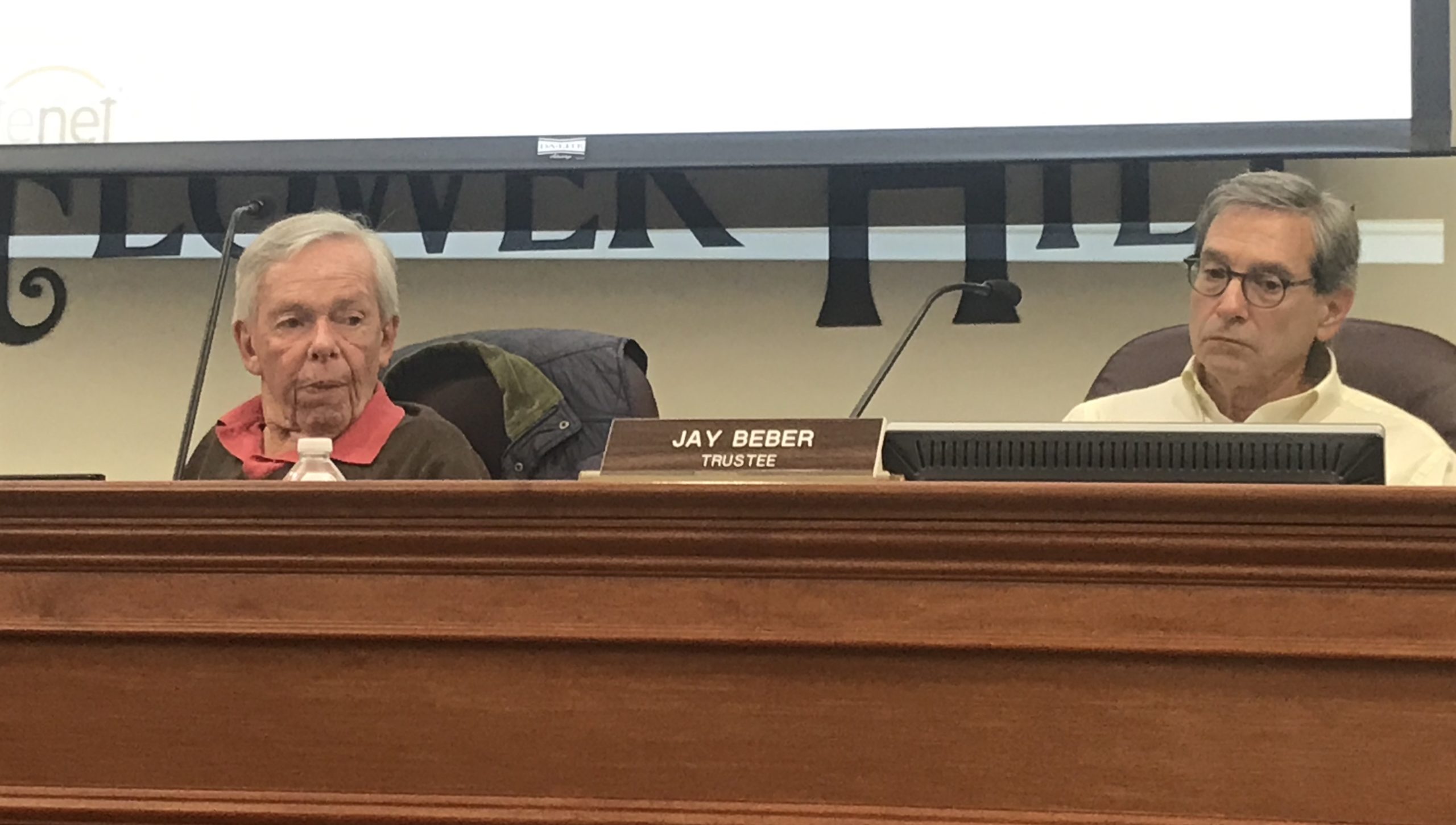Residents packed the Flower Hill Board of Trustees meeting on Monday and expressed concerns, many regarding potential health risks, about the possible installation of 18 small cell nodes to improve Verizon cellphone service.
“My problem with the installation of these nodes is that we don’t have enough research done to know how harmful they really are, and improved service is just not a good enough reason, especially when our service is really currently good now,” said resident Liz Oppo, who is the director of the Katie Oppo research fund, which finances cancer research.
The public hearing included a presentation by ExteNet, the company that has filed an application with the village to build the cell nodes for Verizon. ExteNet designs, builds and owns distributed networks for wireless service providers. The company offers outdoor distribution networks that enable and improve mobile and wireless services in suburban settings, according to its website.
“My personal feeling is that there’s no significant health risks,” said Rich Rehak Jr., the company’s senior project manager for the Northeast region-fiber. “It is well, well within the limits of exposure as set by the FCC. As such, I have little concern.”
Trustee Kate Hirsch received a round of applause from residents after questioning whether the limit of exposure numbers were really accurate. She said she believed that the last time the health risks were looked at was in 1996.
“I know you’re technically assuming it’s under this regulation, which I’m not so sure it is,” Hirsch said to the ExteNet employees present.
“I think that it’s a little bit of a hot button with the public obviously, and understandably so,” said Rehak. “I don’t think there’s anyone in the modern world that isn’t concerned about their health. At the same time, I think that if you really look at the data it’s not a fact-based argument. It’s an emotional argument and not a fact-based argument.”
Despite ExteNet’s presentation stating that the cell nodes are within FCC requirements and pose no known risks to residents, many in the crowd remained unconvinced.
“So the issue becomes, why are we the science experiment and how can we stop this from happening, because right now it’s 4G, tomorrow it’ll be 5G, and there’s no research at all showing that this is safe,” said Oppo. “There is some research out there that’s saying it’s dangerous. There are a lot of questions and a lot of problems and I really hope that we can block this.”
Village Attorney Jeffrey Blinkoff said at the meeting that there is a chapter under village code that relates to telecommunications as well as the installation of “small cell wireless facilities” which was recently amended to comply with federal requirements.
“Essentially a small cell wireless facility is roughly no more than six cubic feet in size which is often attached to a phone pole or a street lamp,” said Blinkoff. “By installing a number of these, the goal of the particular applicant would be to expand mobile wireless service.”
Throughout the presentation, many residents also expressed concerns about whether these cell nodes are necessary. When ExteNet showed a coverage map provided by Verizon that color-coded the levels of service in the area, multiple residents in the audience began saying that their cellphone service was fine.
The coverage map indicated that Flower Hill could use improved 4G service.
ExteNet’s presentation outlined where each cell node would be built. The installations include a mixture of attaching the nodes to existing utility poles coupled with attaching the nodes to street lamps that ExteNet said it would be responsible for building.
ExteNet said that the street lamps would be about 30 feet tall. The utility poles range from 34 feet to 40 feet high, according to ExteNet’s presentation, although many of the poles already exist throughout the village. The presentation noted that a few existing poles would need modification to allow cell nodes to be put onto them.
The presentation also included examples of poles and street lamps that ExteNet has previously built, as well as photos of potential street lamps that the company said could be built for the village.
Many of the existing utility poles sit near homes in the village. A number of residents continued to express concern over the possible health effects that living near these cell nodes would have.
An ExteNet official countered by saying that because the cell nodes are higher on the poles, “most of the energy just goes above the people’s heads.”
Aesthetic issues were raised as well. A few residents said that many of the installations of street lamps were very close to private property and that a 30-foot street lamp seemed very high.
Throughout the presentation, the board reminded residents that the board had not decided whether to allow the building of the cell nodes.
“This was the first opportunity for ExteNet to provide the community with information on their application to install a network of distributed antenna nodes in Flower Hill,” said Trustee Brian Herrington. “The board looks forward to the June meeting where the community can provide additional feedback and we can receive updated information from ExteNet on their proposal. In the meantime, we hope residents will review the information provided in the application and reach out to ExteNet and the village with additional questions.”
The next meeting will be on June 3 and will continue to discuss the application.



